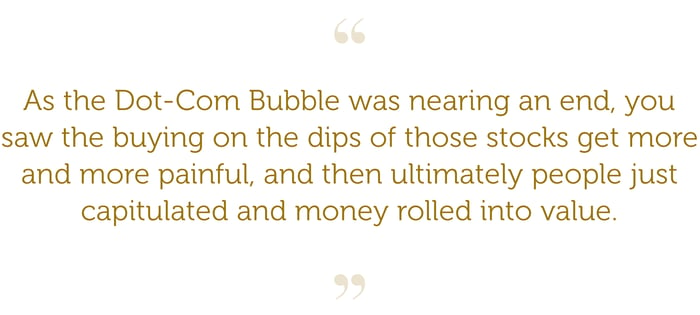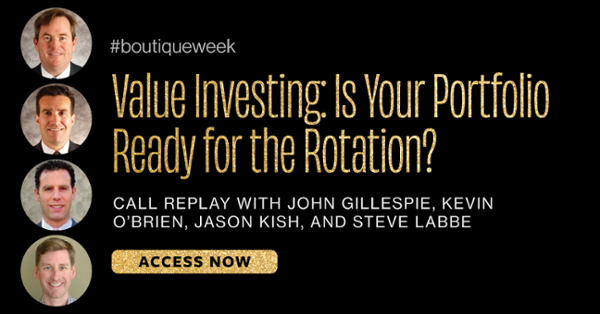Prospector Portfolio Managers John Gillespie, Kevin O’Brien (CFA), Jason Kish (CPA, CFA) and Steve Labbe (CFA) recently conducted a video conference call with Stacy Havener, Founder & CEO of Havener Capital Partners, in which they discussed 2021’s rotation toward value stocks as well as aspects of today’s market that remind them of the dot-com bubble, among other relevant topics.

The question about whether 2021’s “great value rotation” is sustainable was an overarching theme throughout the conversation. Jason Kish offered his opinion on the prospect of value stocks continuing to outpace growth stocks:
Jason Kish: I think the short answer is, yes, we feel this is a real thing. I mean, looking at growth companies and growth valuations, it's been easy over the past decade-plus of lower and lower interest rates to rationalize ever-increasing valuations for growth companies, since you're discounting the future earnings at lower interest rates. And we do think we're in a period of rising interest rates right now. I'm sure we'll get into this more later, but the backdrop now is very different than when we were coming out of the Great Financial Crisis where we needed to go through a massive de-leveraging cycle, which was deflationary, and we're sitting here now with record stimulus, an improving economy, and we feel that despite the recent pause, we are in a rising interest rate environment and that should help value stocks.
Stacy Havener then followed up by asking Jason what types of signals could indicate that value’s rally has staying power, to which he responded:
Jason Kish: It's always hard to say as far as timing or staying power. Last time, after the Dot-Com Bubble burst, we had something like a seven year value outperformance, and I'm not saying that that's what we're going to have, especially since it seems like things happen more quickly these days, be it from algo funds, momentum funds, et cetera. We passed around an interesting Bloomberg article yesterday that I think is relevant. Momentum seems to feed on itself. This article was talking about a $15 billion quant fund that due to the last year's performance, was reallocating amongst industries. And if I have my numbers correct, the fund was going from less than a 2% allocation to financials to 32%, and from a 40% allocation in tech down to, I believe it was, 17%. So, I don't know how much of that is happening or going to happen, but like I said earlier, this stuff tends to feed on itself.
As the Dot-Com Bubble was nearing an end, you saw the buying on the dips of those stocks get more and more painful, and then ultimately people just capitulated and money rolled into value. At the beginning of the year, for example, billions of dollars flowed into trendier tech ETFs as people bought the dips, but many of those investors/traders have seen continued losses, and those funds have seen outflows as a result. So, this could keep snowballing, and I guess we'll see.
Interested in hearing more on topics related to the new economic cycle, inflation and value investing? Check out the full video call with the portfolio managers titled Value Investing: Is Your Portfolio Ready for the Rotation? Click on the graphic below to get started.


